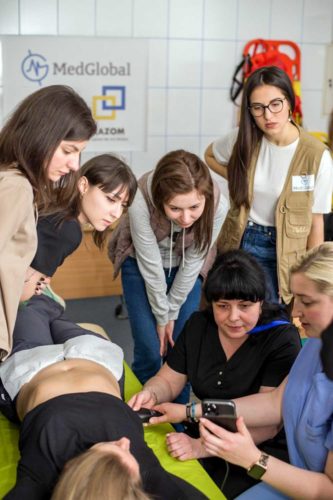
Ukrainian culture is in Tanya Bucierka’s life blood. As a second generation Ukrainian American, Bucierka says she grew up engulfed in the culture, from Ukrainian dance classes and church to summers in Ukraine visiting family.
So when she — a Ukrainian-speaking emergency room doctor living in Eugene — got word of the Russian war on Ukraine, Bucierka knew she had to help.
“I thought, if there is anybody that’s meant to go and help over there, it’s me,” Bucierka says, adding that when the war broke out she immediately reached out to several non-governmental organizations (NGOs) to find one to travel into Ukraine with. And she wanted to be in Ukraine itself — not on the outside.
“I didn’t want to be on the border,” she says. “I wanted to go into the country and help people.”
Since the war broke out in February, Bucierka has traveled to Ukraine three times, leaving for her most recent trip on Sept. 25 and staying through October. Her previous trips were in April and June. While in Ukraine, she has helped treat refugees and train doctors.
During her month-long first trip in April, she spent a week working with a U.S.-based NGO called MedGlobal and teaching “point-of-care” ultrasound to Ukrainian doctors, she says. Point-of-care ultrasound is a diagnostic tool where the ultrasound is performed and interpreted by the attending physician right there. In Bucierka’s case, she taught Ukrainian doctors how to use a handheld portable ultrasound device that can plug into a smartphone. These devices can be used on the frontlines to detect collapsed lungs or blood in the abdomen or heart. Bucierka’s MedGlobal team mailed the devices and volunteered to teach doctors, she says.
The first time she helped teach the ultrasound courses while in Ukraine was over Zoom, but the second time she was set up at a medical university in the city Ternopil. Doctors from all over Ukraine came to the two-day ultrasound classes taught by her and an ICU physician from Philadelphia, she says, and surgeons also taught surgical procedures using pig cadavers. The university was in a location safe from the war at the time in the west.
“Because civilians in Ukraine can’t own guns, gun violence is not a thing in Ukraine,” Bucierka says. “So their surgeons are just not used to what they’re seeing with war injuries.”
Outside of the week she spent training doctors with MedGlobal during her first trip, Bucierka says she spent that month in Ukraine treating refugees. She and a nurse rented a car, and drove to several refugee areas, treating patients in various makeshift clinics — sometimes in a school nursing office.
“Kids aren’t going to school, schools are emptied and they’re used for housing refugees,” Bucierka says, “everybody from the east that’s now living in the west.” The Russians invaded Ukraine Feb. 24 on their shared eastern border, and much of the fighting has been happening there.
Even though Bucierka traveled to western Ukraine, where it is safer than eastern Ukraine, the safety is still relative. She first flew into Poland then drove into Ukraine through their shared border on the first trip, and that day a car repair shop was bombed, Bucierka says. Air raid sirens are a daily occurrence. She says on the last day of her trip, five missiles hit the city she was in.
“It’s very surreal,” Bucierka said about her first time being in a war-stricken Ukraine. “When I go to Ukraine, it’s typically to see my family and to vacation. This was very different.”
Instead of the leisure she was used to having in Ukraine, Bucierka described the fear she felt in pitch-black cities each night, streets empty due to a nightly curfew. She says she had to remain vigilant when walking around cities — always carrying around first aid supplies, personal items such as phone chargers, personal protective equipment in case of chemical warfare, and being aware of the nearest bomb shelter.
“I’m very familiar with the cities I was in, and I had never thought about ‘where’s a bomb shelter’ when I had been there previously,” Bucierka says.
Through the trauma of war, Bucierka says that the Ukrainian people are staying resilient and doing everything they can. From churches collecting money to restaurants closing down to provide space for a World Central Kitchen, a nonprofit NGO that provides fresh meals on the front lines of a crisis or disaster, to average people weaving camouflage nets for the military, everybody is doing something.
“I’ve never seen anything like that in my life,” Bucierka says. “When I say everybody is doing something, they are.”
During her most recent trip to Ukraine this past October Bucierka was awarded the Golden Cross by the Ukrainian Greek Catholic Church Military Chaplaincy for her volunteer efforts and fundraising for the Ukrainian army. She was also given a humanitarian award at the MedGlobal’s annual gala in November.
Bucierka has every intention of continuing trips to Ukraine until the war ends, she says. She leaves for her next trip in early January 2023. Bucierka says she wants to help train as many doctors as she can, aiding in the survival of Ukrainian people. And she wants people to keep the war in their minds as well, she says.
“I want people to know that the war is absolutely still going on, and that Ukraine needs everybody’s support,” Bucierka says. “It’s fallen off all the news headlines, but people are dying on a daily basis.”
MedGlobal is an NGO created in 2017 to provide emergency responses and health programs to people harmed by wars and other disasters in low-resource settings. Donations can be made at MedGlobal.org/donate.